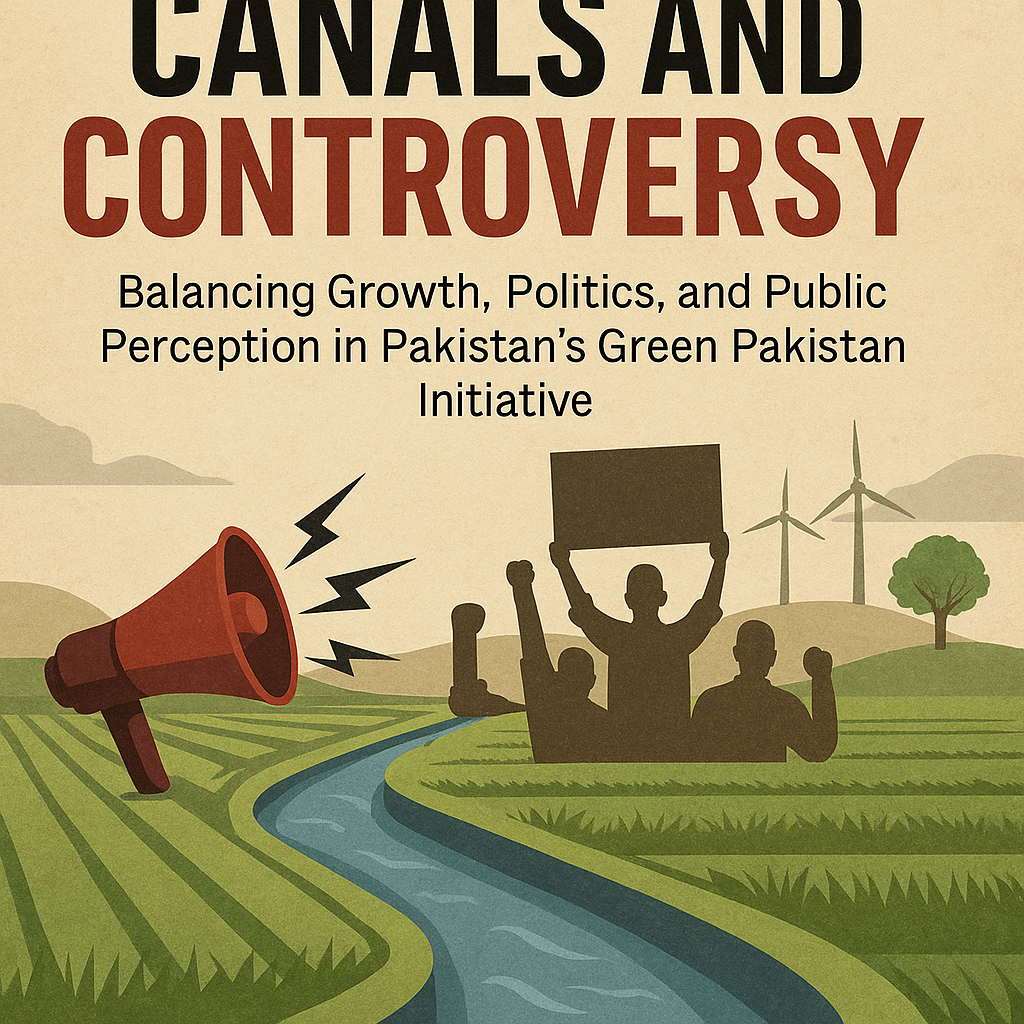
Muhammad Atta Ullah Khan
Since the Federal Government unveiled plans to construct six new canals, the initiative has sparked widespread discussion in national and international media—each framing the project according to their respective narratives. The general public, especially in South Punjab and parts of Sindh, remains largely unaware of the true implications—positive or negative—of this ambitious development. In these regions, farmers’ associations and local political groups have mobilized people to protest, fostering suspicion, mistrust, and disinformation, largely due to a lack of transparent and credible information. These concerns are being amplified by baseless allegations from parties with vested interests.
BACKGROUND OF THIS INITIATIVE
According to the initial proposal, a network of six canals will be built across the country to irrigate millions of acres of barren land as part of the $3.3 billion (945 billion rupees) Green Pakistan Initiative (GPI) launched by Prime Minister Shehbaz Sharif in 2023. The project was formally inaugurated in March 2025 by Chief of Army Staff General Asim Munir and Punjab Chief Minister Maryam Nawaz.
Supporters have hailed the canal project as a game-changer that could transform vast desert areas into fertile farmland. During the inauguration, General Asim reaffirmed the military’s commitment to supporting the country’s economic growth.
FEDERAL GOVERNMENT’S STANCE
According to the Ministry of Planning, the Green Pakistan Initiative (GPI) was introduced in July 2023 to modernize Pakistan’s outdated farming practices and boost agricultural productivity. The project aims to:
- Introduce modern technologies like drones, land management systems, and mechanized tools.
- Provide improved seeds and fertilizers.
- Offer technical inputs, including soil testing.
- Attract both domestic and foreign investment.
In 2023, Pakistan imported $9 billion worth of food despite facing a balance of payment crisis and relying heavily on IMF loans. To improve food security, the government authorized a private company—Green Corporate Initiative (GCI), led by retired military officer Shahid Nazir—to transform 4.8 million acres of barren land into cultivable farmland.
The government asserts that the project will create 60,000 jobs and focus on cultivating key crops like wheat, cotton, sunflower, canola, rice, and lentils. Initially, land will be leased to investors (both foreign and local) for 30 years, with a minimum allocation of 1,000 acres per investor. The model is intended to inspire and guide small farmers to adopt global best practices through partnerships and knowledge transfer.
FROM DEBATE TO CRITICISM TO DEMONSTRATIONS
Since its inauguration in February 2025, public response to the project has been mixed. Initially, discussions centered around technical debates led by water experts. However, regional pressure groups in South Punjab (especially in Bhakkar and Layyah) and Sindh escalated their opposition, branding the initiative as a threat to the Indus River and terming it unviable.
Social media campaigns began framing the canals project as an inter-provincial water theft, prompting political parties—especially the PPP and PTI—to leverage the issue for political mileage. PPP, responding to pressure from Sindhi nationalist groups, vocally opposed the project. Some nationalist parties went further by organizing rallies and protest demonstrations.
Meanwhile, PTI, known for opposing PML-N-led initiatives, submitted a resolution in the National Assembly demanding that the Cholistan canal project be halted until the Council of Common Interests (CCI) gives its formal approval.
What began as a technical development project with economic potential is now embroiled in political point scoring. The anti-canals narrative has created confusion among the general public, leaving many unsure about the real facts behind the initiative.
WHAT NEXT
A critical question now faces the nation: should the project proceed or be abandoned—similar to the fate of the Kalabagh Dam, which was shelved due to politicization and regional distrust?
The political segments opposing the project remain unconvinced by government assurances and are demanding its immediate cancellation. Meanwhile, the government’s silence is being viewed as either tactical or mysterious. The public, caught in the middle, deserves clarity on both the pros and cons of this national initiative.
WHAT TO DO
Should this project meet the same fate as the Kalabagh Dam, which was sidelined based on similar rhetoric? Have we learned nothing from the economic loss resulting from that inaction?
National consensus is undoubtedly essential before launching such projects. However, consensus must be built through mutual trust, transparency, and with national interest as the core objective.
HOW TO MOVE AHEAD
There are signs that the government is engaged in dialogue with stakeholders to find a workable solution. However, the public remains unaware of any concrete plan. While the Council of Common Interests (CCI) is the appropriate platform to address provincial concerns—especially from Sindh—the political repercussions must be carefully considered beforehand.
If the government remains silent and allows negative propaganda to spread, it risks both political backlash and the sabotage of a critical national project. Prime Minister Shehbaz Sharif should assign senior Cabinet members to seek briefings from IRSA and water experts, and to address grievances before the situation escalates further.
The author is former Joint Director General Intelligence Bureau, Govt of Pakistan and a geo-political analyst.

